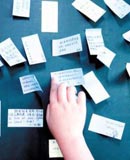不支持Flash
|
新浪教育 > 英语考试 > 2009年6月大学英语四六级考试 > 正文
09年6月六级听力Passage2真题(昂立)
Passage 2 TEST TWO 1分47秒
Dr. Allen Hersh designs smells for businesses. He says that it doesn’t take a whole lot of smell to affect you. Store owners can lure you to the candy aisle, even if you don’t realize your are smelling candy. This idea scares a lot of people. Groups that protect the rights of shoppers are upset. They say the stores are using a kind of brainwashing which they call “smell-washing”. “It’s pretty dishonest,” says Mark Silbergeld. He runs an organization that checks out products for consumers. The scientists hired to design the scents disagree. “There’s soft background music. There’s special lighting. There’re all sorts of bells being used,” says Dr. Hersh, “why not smells?” “One reason why not,” says Silbergeld, “is that some people are allergic to certain scents pumped into products or stores。” But there is a whole other side to this debate, “do the smells really work?” So far, there is little proof one way or the other. But Dr. Hersh has run some interesting experiments. In one of Hersh’s experiments, 31 volunteers were led into a shoe store that smells slightly like flowers. Later, another group shopped in the same store, but with no flower odor. Dr. Hersh found that 84% of the shoppers were more likely to buy the shoes in the flower-scented room, but Hersh found out something even stranger. “Whether the volunteers like the flower scent or not didn’t matter,” Hersh says, “Some reported that they hated the smell, but they still were more likely to buy the shoes in the scented room。”
Questions 29 to 31 are based on the passage you’ve just heard。
Q29. Why are some people against the use of smells to attract customers?
Q30. What is Dr. Hersh’s attitude to the use of smells for business?
Q31. What did Hersh’s experiment show?
特别说明:由于各方面情况的不断调整与变化,新浪网所提供的所有考试信息仅供参考,敬请考生以权威部门公布的正式信息为准。
网友评论
相关链接
- 09年6月六级A卷考试仔细阅读答案(恩波) 2009-06-20 18:34
- 09年6月六级A卷考试翻译部分答案(恩波) 2009-06-20 18:33
- 09年6月六级作文真题及范文(昂立) 2009-06-20 18:32
- 09年6月英语四级真题完整答案(新东方) 2009-06-20 18:28
- 名师点评09年6月六级听力长对话真题(昂立) 2009-06-20 18:18
- 09年6月英语六级考后难度调查 2009-06-20 09:57:40
- 快来吧!英语六级考试考后对答案! 2009-06-19 14:16:10
- 广东54万人周六参加大学英语四六级考试 2009-06-19 14:01:39
- 江苏80万考生本周六参加英语四六级考试 2009-06-19 11:43:39
- 09年6月英语六级最后冲刺三套卷 2009-06-19 11:09:46
- 09年6月英语六级冲刺模拟试题一及参考答案 2009-06-19 10:53:10
- 09年6月英语六级冲刺模拟试题二及参考答案 2009-06-19 10:48:36
- 09年6月英语六级冲刺模拟试题三及参考答案 2009-06-19 10:37:04
- 甘肃13.8万人20日参加大学英语四六级考试 2009-06-19 10:30:26






